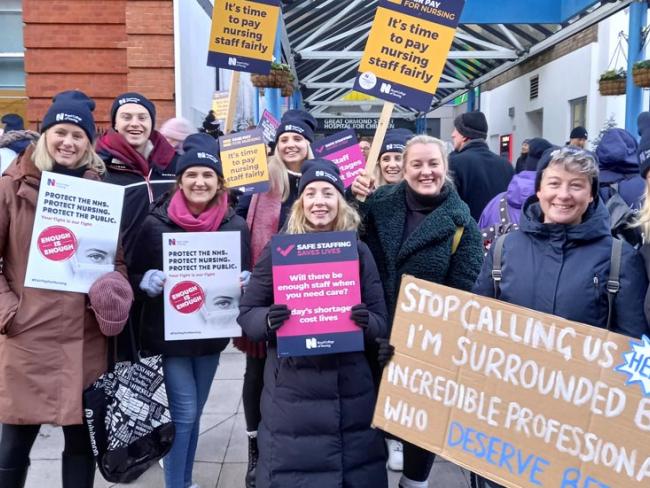
Nurses picketing Great Ormond Street Hospital in December 2022. Photo Workers.
Skilled professionals in the NHS have a chance to take the lead. They must do so…
The NHS is, or should be, what it says on the tin. It’s National. It’s a Service. It deals with Health. Doctors and other healthcare professionals seek to ameliorate the health problems facing people, and hopefully to prevent them.
The NHS needs structures to achieve those aims and to facilitate the work of these professionals; but that’s all structures should do. Yet another reorganisation, badged as reform, is likely to go down the same road as earlier attempts. Workers have to ask why they failed and what might prevent change now.
Any organisation should be run by its most skilled members. The recent history of the NHS shows what happens otherwise. Structures were developed to impede and not facilitate the work of professionals.
They introduced alien concepts: the internal market and privatisation. Their purpose was to wrench control of the service away from skilled professions.
The Thatcher governments of the 1980s brought about dramatic steps backwards. General management replaced clinical leadership; competition replaced planning. This created instability and the import into the NHS of accountants and managers with profit in mind over healthcare.
Variations on these structural changes have staggered on for the past forty years, shifting as the inevitable problems surfaced, but preserving the rotten core. This path seems now to have finally run into the sand. Private contractors remain, but the internal market is crumbling.
Integration
There are still far too many non-clinical bodies, but the welcome watchword of “integration” is taking hold. Abolition of NHS England and rationalisation of other bodies (the merger of the NHS Confederation and NHS Providers being the latest) are to be welcomed. Also welcome is the return of many non-clinical functions to the place they started – central government.
But what happens next? Skilled professions denied the leading role for past decades now have the chance to assert again that role. And to avoid a repeat of the past, they must do so.
The promise of a 10-year plan for the NHS in England is positive – essential after years without. But that only works if those working for the service seize the opportunity to make effective changes.
‘Promises to improve the NHS can’t be taken at face value…’
Pay cannot be ignored. The Pay Review Body is an anachronism which NHS trade unions have decided to discard. But they haven’t yet found a way to force the government to concede. So again an inadequate settlement – 3.6 per cent this year – is imposed, with workers’ energies understandably directed to that immediate question at the expense of the longer term.
Finance can’t be ignored either. The service has always felt itself to be underfunded – often, but not always that’s been the case. Certainly, the NHS hasn’t always used its funds wisely. But now a new situation is emerging. Behind the smoke and mirrors of the latest Spending Review, swingeing cuts in budgets are expected.
Promises to improve the NHS can’t be taken at face value – and funding alone won’t be enough. As with much of what this, or any other, government does, details are vague and plans more designed for social media response than practicality.
But the approach of this government is clear: war (which it calls “defence”) is the priority; health and other services will be cut to pay for that. Unions opposing cuts were derided for saying the public finance was available but being used for war.
NHS workers now have to defend their service in a changed climate – and they will need the support from workers across Britain – not clapping or banging pans, but challenging the government on why it chooses war over peace, death over life.
